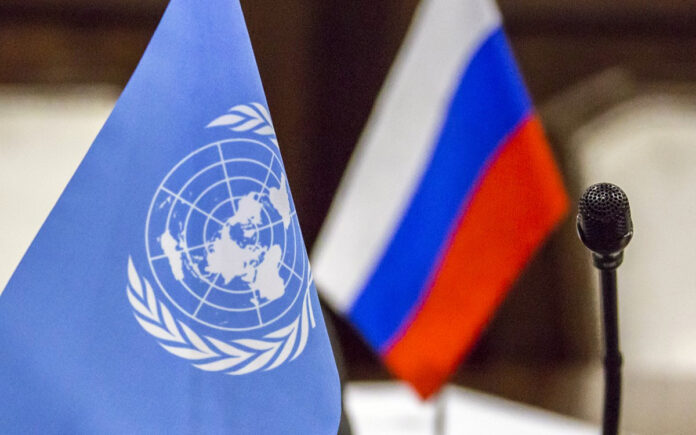New York: Russia exercised its veto power at the United Nations on Monday, rejecting a resolution advocating for the prevention of a nuclear arms race in space. Instead, Moscow proposed a competing resolution urging a comprehensive ban on all weapons in space “for all time,” challenging the US, Japan, and their Western allies.
Vassily Nebenzia, Russia’s UN ambassador, accused the US and Japan, sponsors of the vetoed resolution, of “hypocrisy and double standards”. He alleged that Western nations were planning the militarization of outer space, including deploying “strike combat systems”.
In response, US deputy ambassador Robert Wood countered Nebenzia’s claims, stating that Russia currently possesses conventional anti-satellite weapons in orbit, with evidence of testing and threats to target satellites with weapons, including the development of a satellite carrying a nuclear device.
The verbal confrontation unfolded as Russia issued threats against British military facilities and announced plans for drills simulating the use of tactical nuclear weapons. These actions were prompted by remarks from Western officials hinting at deeper involvement in the conflict in Ukraine.
Also Read | Medvedev Warns of Nuclear Retaliation Against NATO Troop Deployment in Ukraine
In February 2023, Russian President Vladimir Putin announced Moscow’s suspension of participation in the New START treaty amid escalating tensions with the West over Ukraine.
The United Nations expressed growing concern over recent discussions regarding nuclear weapons, particularly Russia’s planned drills simulating the use of tactical nukes. UN spokesman Stephane Dujarric emphasized the urgent need to avoid actions that could lead to catastrophic consequences.
Under a General Assembly resolution adopted in April 2022, any permanent member of the Security Council vetoing a resolution must explain their decision to the 193-member world body.
Also Read | EU Split Over Putin’s Fifth Term Inauguration: Diplomatic Tensions Rise
Before the vote on the US-Japan resolution, Russia and China proposed an amendment calling for a ban on all weapons in outer space, which was rejected. Subsequently, Russia vetoed the US-Japan resolution, leading to the circulation of its own resolution calling for a ban on all weapons deployment in outer space indefinitely.
Nebenzia argued that the opposition from the US and its allies stemmed from their intentions to deploy weapons in space and use force against objects in outer space.
Wood questioned Russia’s sincerity, citing its veto as evidence contradicting Putin’s claims that Russia had no intention of deploying nuclear weapons in space. He emphasized concerns about Russia’s compliance with existing legal obligations under the Outer Space Treaty.
Also Read | European Companies Tread Cautiously Amid China’s Belt and Road Challenges
The vetoed US-Japan resolution aimed to affirm compliance with the 1967 Outer Space Treaty, which prohibits the placement of weapons of mass destruction in orbit around the Earth or on celestial bodies. Wood urged support for the treaty and cautioned against Russia’s attempts to divert attention from its provisions.
Japanese Ambassador Yamazaki Kazuyuki underscored the catastrophic consequences of a nuclear detonation in outer space, emphasizing the potential impact on critical space infrastructure and development worldwide.



